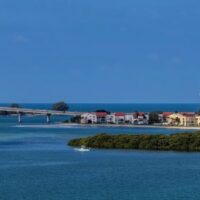CLEARWATER FERRY CRASH. THIS IS WHAT HAPPENS NEXT

On April 27, 2025 at 8:40 p.m. a 38-foot Statement vessel driven by Jeffrey Knight ran into the back of the Clearwater Ferry with 45 people on board the ferry. Tragically, one man, Jose Luis Castro, age 41was killed in the crash. Several other passengers on board the ferry were injured. This is what happens next.
A Limitation of Liability lawsuit will be filed against known and all unknown potential claimants. This will be filed in federal court in Tampa. What is a Limitation of Liability lawsuit? It essentially asks a federal judge to find that the owner of a vessel had no negligence in a case in which damages were caused that involved the owner’s vessel. Most often Limitation actions are initiated at the request of the vessel owner’s insurer who then employees a maritime defense attorney to file a Limitation action in the federal court nearest to the accident scene.
When can this be filed? A Limitation of Liability (known as a “LOLA” by maritime attorneys) action can be filed at any time after an accident that involves a vessel. The statute 46 U.S.C. 30501, et seq., and Federal Rules of Civil Procedure which govern such actions state that an owner of a vessel must file a Limitation action within six months of receiving notification of a claim which places the owner on notice that the claim(s) are reasonably expected to exceed the value of the vessel involved in the crash. In this case of the Clearwater Ferry crash, there is no reason for the owners of either of these vessels to wait for notification or for six months to expire. And they likely will not wait.
There is little benefit to waiting for a LOLA action to be filed by Jeffrey Knight except for the outrage that is sure to follow when accident victims and the families understand what the objective is in filing such an action in federal court. The objective in a LOLA action is for the “Petitioner”, the vessel owner, is to seek complete exoneration from all liability, or at worst, to limit the owner’s exposure to all claimants down to the worth of the at-issue vessel after the crash. In extreme cases where the vessel is severely damaged that could mean a petitioner is asking a federal judge to limit the vessel’s owner’s liability to almost nothing.
In this case, multiple lawsuits can be filed against the vessel owners. A Limitation action places a “stay” on all such actions. A Limitation action further forces all claimants to make their claim in the one Limitation action in federal court.
If either or both owners of these vessels file a Limitation action it forces all claimants into one forum, in the federal court. It also forces the claimants to be subject to the findings of a federal judge and under such circumstances there is no right to a jury trial. That is huge. Jurors in cases involving tragedies like this can make large awards; federal judges are less likely to make awards as high as jurors. And the federal judge must first answer the question as to whether limitation of damages is appropriate as to the vessel owners.
That is why a Limitation is assuredly coming sooner rather than later: to force all claimants into one forum, and to ensure that forum is the federal court with no right to a jury trial there. It is also important to note that a claimant must timely file their claim in federal court after a Limitation action is initiated. A federal judge would assign an end date by which any and all claimants must file their claims, or the claims could be barred forever. The claimant not only needs to timely file a claim in any Limitation action, but also importantly needs to do it correctly.
HOW DID WE GET HERE THAT THIS IS THE LAW?
In 1851 the U.S. Congress passed this law—and it has been revised many times—which then essentially tried to encourage the development of private shipping in the United States. It was common then, and still is today, that the owner of a commercial vessel leases (i.e., “charters”) out a vessel to a third-party who is capable of running the vessel, manning the vessel, and safely navigating the vessel. The 1851 Congress decided that if the vessel was later involved in a casualty while in the hands of that third-party and due to no negligence on the part of the owner, then the most the owner could lose was the value of that vessel. In other words, the remainder of the owner’s assets could not be attacked, the maximum the owner would lose is the value of the vessel—after the crash. And unfortunately, the U.S. Supreme Court has made it clear that the Limitation act does apply even down to recreational vessels like the 38-foot Statement involved in this case.
FLORIDA LAW DOES NOT APPLY TO THIS CASE
For almost all aspects of this tragic crash, Florida law does not apply. Federal maritime law does. What this means is the families need to know “car accident law” does not apply to this case. Yes, there can be potential criminal aspects to the case which are governed by Florida laws, but that is on the criminal side of the case. For the civil side, recovery for damages for medical bills, lost wages, pain and suffering, and liability in the death case, will have maritime law applied to them, not car accident law.
At least one Limitation action is coming, if not one for each vessel. When they will be filed is not assured. What is assured is that they will be filed. And the strong likelihood that any Limitation action will be filed sooner rather than later
About the author. Frank D. Butler, Esquire is an attorney in Tampa Bay and practicing in maritime law for more than 25 years.
